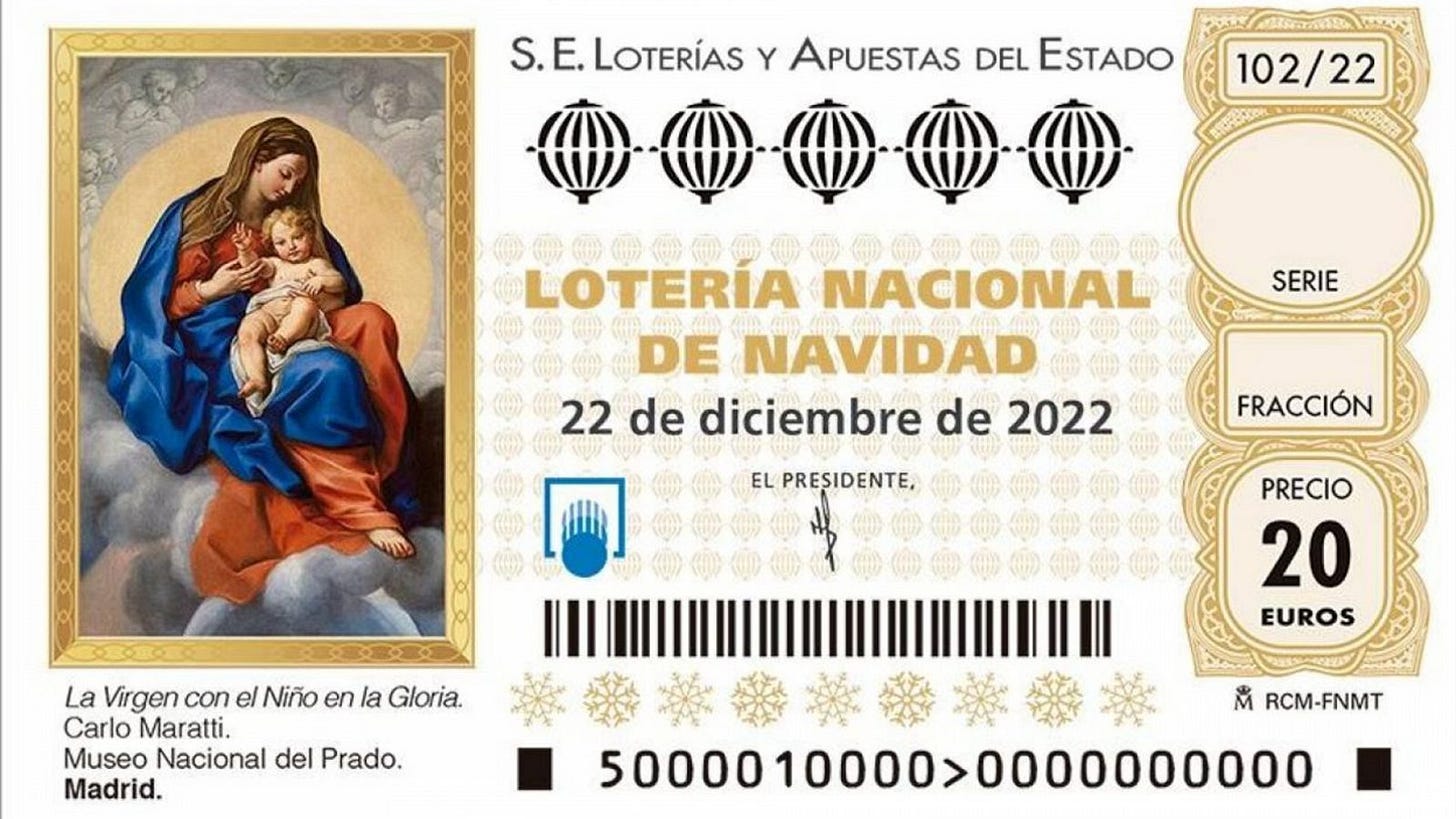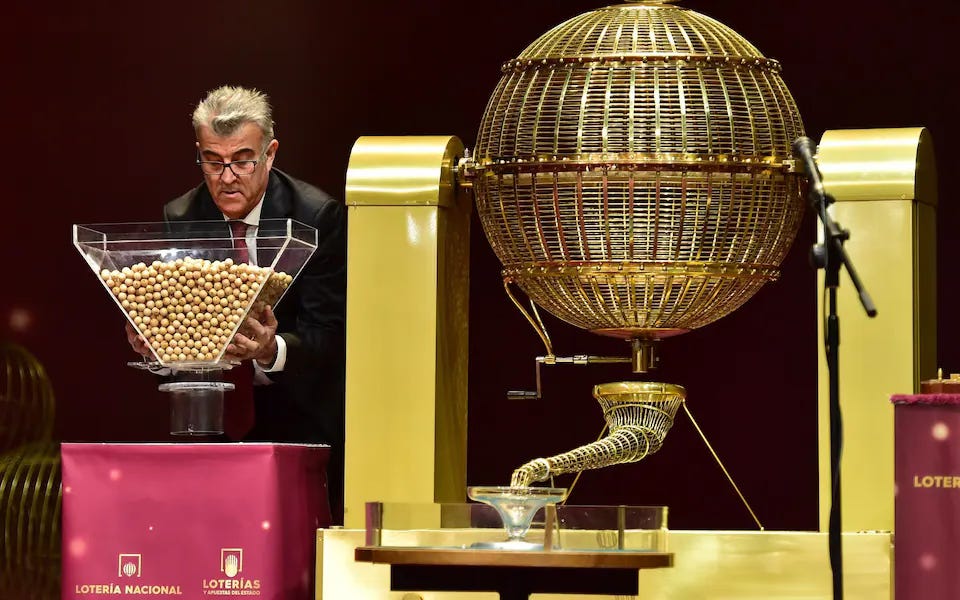The Spanish Christmas Lottery: Dreams, Regrets, and the Reality of Your Odds
How Much Does it Really Cost You to Dream of El Gordo?
This is The Curious Mind, by Álvaro Muñiz: a newsletter where you will learn about technical topics in an easy way, from decision-making to personal finance.
The Spanish Christmas Lottery promises life-changing prizes, but behind the scenes there is a harsh mathematical reality.
With a 1 in 100,000 chance to win the famous El Gordo, the lottery is much more likely to result in disappointment than in fortune. Despite the massive prize pool and the many smaller prizes, the odds remain clearly unfavourable, with players destined to lose money over time. Ultimately, the appeal of the lottery comes not from the math but from the dreams and regrets it can spark.
Today we demystify the numbers and the psychology behind the game to help you decide if it’s worth buying a ticket.
Some Facts
The Spanish Christmas Lottery is the most important lottery draw in Spain.
It is actually the biggest lottery draw in the world: in 2024, if all tickets were sold the sum of all the prizes would be 2,702,000,000€.
It is the second oldest lottery draw in the world, happening since 1812.
During the Spanish Civil War, two draws were held each year, one on each warring side.
The Math of the Christmas Lottery
We all know that winning the Christmas Lottery is very hard.
But have you ever wondered precisely how hard?
The Structure of the Christmas Lottery
Here is a simplification of how the Christmas Lottery works:
There are a total of 100,000 numbers, from 0 to 99,999.
There are 1,930 tickets issued for each number, so that many people win with each number. Each participation in a number is called a 'décimo'.
Each décimo costs 20€.
On the 22nd of December, several numbers are selected randomly, each of them having a prize. Every person with a décimo for that number receives that prize.
Thus, if you play the Christmas Lottery you buy a décimo for a number, paying 20€. There can be (at most) 1,930 people who bought the same number, and all of them will receive the same prize for each décimo they bought.
The Prizes
The Spanish Christmas Lottery is famous for giving out many prizes.
The most famous prize is, by far, El Gordo: for each décimo you have, you win 400,000€. This means that, for each euro you spend, you get back 20,000€. Since each number has 1,930 décimos, there will be 1,930 people receiving such prize (assuming all décimos were sold), for a total of 772,000,000€.
Everyone knows El Gordo, but the Christmas Lottery is much more than that.
There are a total of 15,304 prizes, 1,807 of them being 'direct' prizes and the remaining 'indirect'. After doing some math, this means that the probability that you get at least one prize is about 15%.
Of course, not all prizes are the same. While El Gordo gives you 400,000€ for each décimo, the lowest direct prize—"La Pedrea"—gives you only 100€, and the lowest indirect prize—so called "reintegros"—just gives you your investment back, 20€.
The Bad News
I said before that you will get at least one prize about 15% of the time.
The key question, however, is not how often you get a prize, but how large that prize is when you get it. If you get El Gordo or a similar-sized prize 15% of the time, I would advise you to invest almost all your money every single year in the lottery.
This is clearly not the case. El Gordo is the first prize, awarded to a single number. There are a total of 100,000 numbers, so there is a 1 in 100,000 chance that you will win El Gordo on a given year if you buy one décimo.1 If you do some math, you get some sad results:
If you buy a lottery ticket every single year from age 18 to age 70:
the probability that you will El Gordo at least once in your life is 0.05%.
this means you will need to live, on average, 1,888 lives to win El Gordo.
This is just for El Gordo, but the Christmas Lottery has many more prizes. Does this improve things?
Unfortunately, not much. If you consider all possible prizes, how likely it is that you get each of them, and how much you get with each of them, then you see that the lottery is a losing game.
For each euro you play in the lottery, you get back, on average, 0.70€.
Thus, for every 20€ you play, you get back 14€. Effectively, buying a décimo is the same as throwing away 6€.
I have not even considered the taxes you pay if you get a prize—this just makes things worse!
Gambling for Wins
We saw that, when playing the Christmas Lottery, we win, on average, 14€ for each décimo (I say 'win' but remember that it is actually a loss: we win 14€, but we invested 20€).
So why do we play the lottery?
Ignorance
I think the first reason is simply ignorance.
You probably knew that the lottery was very hard to win, but did you ever actually bothered researching how much of a losing game it was? I myself hadn’t (in fact, I must say I thought it was worse than it actually is!) and I think many people don’t even have the numerical skills necessary to work it out. The Spanish Government and the media contribute to this perception, by promoting the lottery as a cherished Christmas tradition to share and enjoy with loved ones.
I hope that this post helps you understand something useful about the lottery, and what you are doing each time you play (essentially throwing away 6€). From a mathematical perspective, it’s a resounding NO.
However, we are humans, not perfectly rational, utility-maximising robots. Here are some other reasons why I think people play the lottery.
Regret
I often hear the following argument to play the lottery:
I only buy the lottery together with other people, like with my coworkers. What if the number they bought at the office gets El Gordo, and I am not in?
This is a perfectly valid argument. It is not a mathematically or financially good decision, but it can be a psychologically good decision. This is specially true for people how are used to playing the lottery, as the following example demonstrates:2
Álvaro and Laura work in the same office. Álvaro never buys the office’s lottery ticket, while Laura buys it every year. This year, Laura decided not to buy the lottery either, and El Gordo was awarded to their office.
If the regret of your office mates winning El Gordo and you not being in is worth to you 6€ per year, go for it (although, remember that on average you would need to live 1,888 lives to experience such regret, and by the time you win your 400,000€, you would have thrown away over 2 million euros!).
The Possibility Effect
This is something that has been researched in the literature, and that I recently learned from Kahneman’s book Thinking, Fast & Slow.3
We will talk about this more extensively in a future post, but we can summarise it as follows:
We perceive highly unlikely (but not impossible) events as much more likely than they actually are.
Even though winning El Gordo is extremely unlikely—the chance is 1 in 100,000—the fact that it is not impossible makes our brains perceive it as more likely than it actually is.
For instance, consider the following offer:
The first option is you aiming for El Gordo. On average, you get 4€. I am offering you 4€ straight away, with no randomness involved, yet I don’t think any person would take it. Note that the possibility effect pushes in the opposite direction to our usual risk-averse behaviour, but it happens to be stronger!
We perceive the 1 in 100,000 chance as far larger than it actually is, making us overestimate the value of the first option. As Kahneman puts it:
“A lottery ticket is the ultimate example of the possibility effect. Without a ticket you cannot win, with a ticket you have a chance, and whether the chance is tiny or merely small matters little.”
Dreaming
And, of course, lottery buys us the possibility to dream.
Imagine I won 400,000€! What would I do with them? Would I buy a house, travel the world, give some to my parents…? It would change my life!
Would you pay 6€ to enjoy such dreams? If so, then you might have a point to play the lottery.
Conclusion
The lottery is, mathematically and financially, a bad decision. There is no discussion about this.
If you are aware of this but still decide to play it (for some of the other reasons we mentioned above), go for it. But always know what you are doing!
What’s coming
The possibility effect and why we buy insurance
The certainty effect and how it affects our approach to risk
Risk policies
In case you missed it:
The Hidden Psychology of Change: How We Value Gains and Losses
Selling your iPhone in 14 Days: How to Choose the Best Offer Using Math
From Profit to Utility: Approaching Risk in Financial Decisions
Profit vs. Risk: What Betting Games Teach Us About Human Decision-Making
How You Can Make Better Choices (Spoiler: Self-Interest Fails)
What do you want next?
If you buy more than one number, your chances are higher, but your investment is also higher. As we will see, the lottery is a losing game (your expected value is negative), so buying more numbers only makes you lose more money in the long term!
Example adapted from Thinking, Fast & Slow.
Affiliate Link




Obviamente elegiría 1 de 100.000 de ganar 400.000 frente a ganar 4 euros, pero se me escapó el dedo.
Loved it! Great combination of maths and psychology. Also, I didn't know about the two yearly draws during the war! (Not surprising thoough, to be honest 😅)